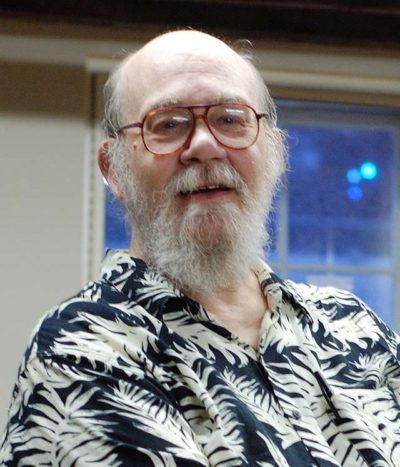Thomas Disch (Thomas Michael Disch)

Thomas Disch entered the field of science fiction at a turning point, as the pulp adventure stories of its older style began to be challenged by a more serious, adult, and often darker style. This movement, called New Wave, tried to show that the ideas and themes of science fiction could be developed beyond the simple engineering-mechanical approach of traditional SF. Rather than trying to compete with mainstream writers on the New York literary scene, Disch plunged into the emerging genre of science fiction, and began to work to liberate it from some of its strict formula and narrow conventions. His first novel, The Genocides, appeared in 1965; Brian W. Aldiss singled it out for praise in a long review in SF Impulse. Much of his more literary science fiction was first published in English author Michael Moorcock’s New Wave magazine, New Worlds. Disch was widely traveled and lived in England, Spain, Rome, and Mexico. In spite of this, he remained a New Yorker for the last twenty years of his life. He said that “a city like New York, to my mind, is the whole world”, keeping a long-time New York residence overlooking Union Square. Writing had become the dominant focus of his life. Thomas Disch described his personal transformation from dilettante to “someone who knows what he wants to do and is so busy doing it that he doesn’t have much time for anything else.” After The Genocides, he wrote Camp Concentration and 334. More books followed, including science fiction novels and stories, gothic works, criticism, plays, a libretto for an opera of Frankenstein, prose and verse children’s books such as A Child’s Garden of Grammar, and ten poetry collections. In the 1980s, he moved from science fiction to horror, with a series of books set in Minneapolis: The Businessman, The M.D., The Priest, and The Sub.
His writing includes substantial freelance work, such as regular book and theater reviews for The Nation, The Weekly Standard, Harper’s, The Washington Post, The Los Angeles Times, The New York Times, the Times Literary Supplement, and Entertainment Weekly. Recognition from his award-winning books led to a year as “artist-in-residence” at the College of William & Mary. During his long and varied career, Thomas Disch found his way into other forms and genres. As a fiction writer and a poet, Disch felt typecast by his science fiction roots. “I have a class theory of literature. I come from the wrong neighborhood to sell to The New Yorker. No matter how good I am as an artist, they always can smell where I come from.” Though Disch was an admirer of and was friends with the author Philip K. Dick, Dick would write an infamous paranoid letter to the FBI in October 1972 that denounced Disch and suggested that there were coded messages, prompted by a covert organization, in Disch’s novel Camp Concentration. Disch was unaware and he would go on to champion the Philip K. Dick Award. In his final novel, however, The Word of God, Disch got his revenge on Dick, with a story in which Dick is dead and living in Hell, unable to write because of writer’s block. In return for a taste of human blood, which will unlock his ability to write, he makes a deal to go back in time and kill Disch’s father, so that Disch will never be born, and at the same time to kill Thomas Mann and thereby to insure that Hitler wins World War II.
Thomas Disch maintained an apartment in New York City, sharing it and a house in Barryville, New York, with his partner of three decades, poet Charles Naylor. Disch’s private life remained private, for the most part. He was publicly gay since 1968; this came out occasionally in his poetry and particularly in his 1979 novel On Wings of Song. He did not try to write to a particular community: “I’m gay myself, but I don’t write ‘gay’ literature.”[14] He rarely mentioned his sexuality in interviews, though he was interviewed by the Canadian gay periodical The Body Politic in 1981. After Naylor’s death in 2005, Disch had to abandon the house, as well as fight attempts to evict him from his rent controlled apartment, and he became steadily more depressed. He wrote on a LiveJournal account from April 2006 until his death (he committed suicide by fatally wounding himself in the head via gunshot), in which he posted poetry and journal entries. Shortly before Disch’s death, in September and October 2007 literary critic Peter Swirski conducted email interviews with Disch concerning his novels The M.D. A Horror Story and the early 334. Excerpts from these exchanges were published in Swirski’s 2010 study Literature, Analytically Speaking – Chapter 7 is mostly on The M.D. – with Disch responding to questions with wit and irony. Thomas Disch was an outspoken atheist as well as a satirist; his last novel The Word of God was published by Tachyon Publications in the summer of 2008. His last published work, the posthumous story collection The Wall of America, contains material from last half of Disch’s career.
Following an extended period of depression following the death in 2005 of his life-partner, Charles Naylor, Disch stopped writing almost entirely, except for poetry and blog entries – although he did produce two novellas. Thomas Disch committed suicide by gunshot on July 4 2008 in his apartment in Manhattan, New York City. His last book, The Word of God, which was written shortly before Naylor died, had just been published a few days before Disch’s death.
Born
- February, 02, 1940
- USA
- Des Moines, Iowa
Died
- July, 04, 2008
- USA
- Manhattan, New York, New York
Cause of Death
- gunshot wound
Cemetery
- Saint Johns Episcopal Church Columbarium
- Dubuque, Iowa
- USA

